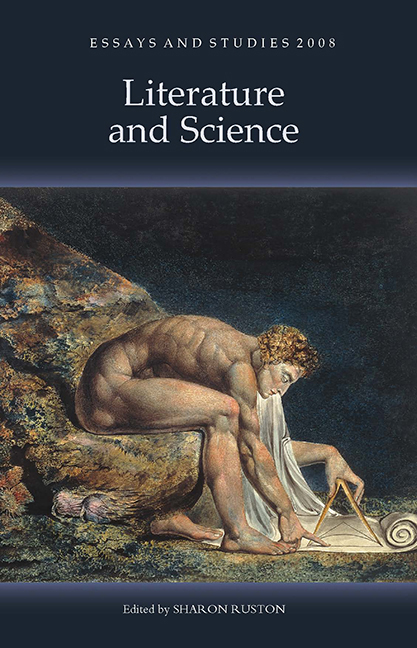Book contents
- Frontmatter
- Contents
- List of Illustrations
- Acknowledgements
- Notes on Contributors
- Introduction
- 1 From Popular Science To Contemplation: The Clouds Of The Cloud Of Unknowing
- 2 ‘Dreams And Plain Dotage’: The Value Of The Birth Of Mankind (1540–1654)
- 3 Natural Rights And Natural History In Anna Barbauld And Mary Wollstonecraft
- 4 George Eliot, Geometry And Gender
- 5 On The Back Of The Light Waves: Novel Possibilities In The ‘Fourth Dimension’
- 6 Le Fanu's ‘Carmilla’, Ireland, And Diseased Vision
- 7 Evolution, Literary History And Science Fiction
- 8 ‘The Luxury Of Storytelling’: Science, Literature And Cultural Contest In Ian Mcewan's Narrative Practice
- Index
2 - ‘Dreams And Plain Dotage’: The Value Of The Birth Of Mankind (1540–1654)
Published online by Cambridge University Press: 12 February 2019
- Frontmatter
- Contents
- List of Illustrations
- Acknowledgements
- Notes on Contributors
- Introduction
- 1 From Popular Science To Contemplation: The Clouds Of The Cloud Of Unknowing
- 2 ‘Dreams And Plain Dotage’: The Value Of The Birth Of Mankind (1540–1654)
- 3 Natural Rights And Natural History In Anna Barbauld And Mary Wollstonecraft
- 4 George Eliot, Geometry And Gender
- 5 On The Back Of The Light Waves: Novel Possibilities In The ‘Fourth Dimension’
- 6 Le Fanu's ‘Carmilla’, Ireland, And Diseased Vision
- 7 Evolution, Literary History And Science Fiction
- 8 ‘The Luxury Of Storytelling’: Science, Literature And Cultural Contest In Ian Mcewan's Narrative Practice
- Index
Summary
WHEN The Birth of Mankind first appeared in print in 1540, it initiated a new kind of publication in Britain: this ‘scientific’ book was the first published text in English that sought to explain to the general reader where babies come from and how to look after them in their infancy. It was to become a phenomenal success, remaining in print in its revised and expanded version of 1545 for more than one hundred years, and passing through many more editions than have yet been counted. This essay will sketch the book's history, before going on to use it as an example of the importance of reading scientific texts, and of reading them historically whilst applying literary critical techniques to analyse such features as metaphor and tone. Such a process both makes these writings a necessary part of the study of literature, and also shows how detailed engagement with materials of this kind necessitates a rejection of the assertions made in Thomas Laqueur's hugely influential Making Sex (1990) concerning the ways in which the differences between male and female bodies were understood in the early-modern period.
First, the book's history. Although when The Birth of Mankind appeared in 1540 it was the first of its kind, it was far from being a new book. The man acknowledged as its originator, Richard Jonas, who was probably the High Master of St Paul's School in London, had translated most of it from De Partu Hominis (‘Of the Birth of Mankind’). To this he added materials gleaned from recent Latin editions of the ancient Greek Hippocratic corpus. De Partu Hominis was not an original publication either, but itself was a translation of a work by a German physician, Eucharius Rösslin. That German book, Der swangern Frauen und Hebammen Rosegarten (‘The Rose Garden for Pregnant Women and Midwives’), came out in 1513, designed as an instruction manual for midwives seeking state registration. It was presumably well-suited to its task, because it remained in print for many decades, also being translated into Dutch in 1516 and staying in print in the Netherlands through at least twenty-eight editions into the eighteenth century. (The system of midwives’ registration in the Netherlands resembled the German one, and sales to would-be midwives might well have been a factor in its popularity.4) The Rose Garden was also translated into Czech, Italian, French, Danish, and, possibly, Spanish (Ingerslev 1909).
- Type
- Chapter
- Information
- Literature and Science , pp. 35 - 52Publisher: Boydell & BrewerPrint publication year: 2008
- 1
- Cited by



